| EMBARGO The contents of this press release and the related Report must not be quoted or summarized in the print, broadcast or electronic media before 22 July 2009, 17:00 [GMT] (1pm New York; 19:00 Geneva) |
Geneva, 22 July 2009 - The global economic and financial crisis has had a major negative impact on foreign direct investment (FDI) plans by transnational corporations (TNCs) in the short-term, the results of this year´s World Investment Prospects Survey 2009-2011 (WIPS) show. Recovery is expected to begin slowly in 2010 and gather momentum in 2011. The annual survey seeks to ascertain the FDI plans of the world´s largest TNCs. This year´s results are based on 241 responses from TNTs that were sent the survey.
TNCs around the world have been strongly hit by the current global and economic crisis, the survey reveals. In contrast to last year´s survey, when only 40% of companies reported being affected by the crisis, a large majority of TNCs worldwide now report that the global economic downturn (85%) and the financial crisis (79%) have had negative impacts on their investment plans (figure 1). Both of these aspects, separately and combined, have diminished the propensity and ability of TNCs to engage in FDI.
In this turbulent environment, large TNCs intend to reduce their FDI expenditures in 2009, the survey indicates, with a recovery beginning in 2010 and a strong rebound expected in 2011. Roughly 58% of the respondents said they intend to reduce their foreign investments in 2009, with nearly one third anticipating a large decrease compared to 2008 (figure 2). However, the persistent trend towards internationalization by TNCs - measured by production, employment, investment and sales abroad - is expected to provide the catalyst for a full rebound in FDI expenditures by 2011. Half of TNC respondents forecast that their FDI expenditures in 2011 will be above their 2008 levels (figure 2).
An analysis of TNCs by their home countries shows the differing impacts of the economic and financial crisis. TNCs from the developing world, especially Asia, were the most optimistic regarding FDI in 2011 (figure 3). In the developed world, sentiment was mixed; companies in Japan and Europe were less optimistic than those in the United States. Responses to the survey also suggest that while TNCs are highly invested in areas that could be considered their traditional home regions, the trend is towards more globalization, with investments spread over many regions.
In terms of the geographical locations for potential FDI, responses to the survey show that the five most attractive destinations are China, the United States, India, Brazil, and the Russian Federation (figure 4). While the members of the top five are the same as in last year´s survey, the United States and Brazil have improved their rankings slightly.
Beyond these five countries, the survey reveals few changes since last year in TNCs´ perceptions of the top 15 locations for FDI. The only new country to be added to the list is Thailand, replacing Turkey and South Africa (who tied in 15th position last year). The United Kingdom, and to a lesser extent Australia, have improved their rankings at the expense of Viet Nam and Indonesia.
In terms of activity, TNCs in business-cycle sensitive industries that have been severely affected by the crisis, such as automotive, metals and chemicals, are among those expressing the most negative views for their FDI prospects (figure 5). On the other hand, some activities in sectors with more stable demand, such as agri-food and many services, or those that supply markets with quick growth prospects in the medium-term, such as pharmaceuticals, have been less affected.
The World Investment Prospects Survey 2009-2011 is the most recent of a series of surveys on FDI prospects. UNCTAD has carried out similar surveys since 1995.
ANNEX
Tables and figures
Figure 1: Impact of various aspects of the crisis on companies´ investment plans 2009-2011(Per cent of responses)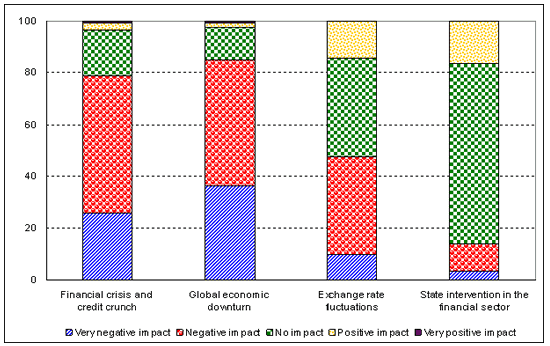
Source: UNCTAD, World Investment Prospects Survey 2009-2011
Figure 2: Respondent companies´ FDI expenditures plans, 2009-2011, compared to 2008 (Per cent of responses)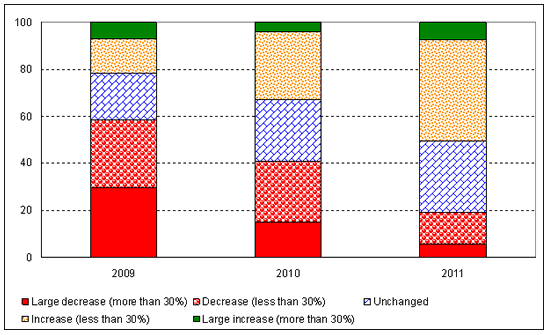
Source: UNCTAD, World Investment Prospects Survey 2009-2011
Figure 3. TNCs´s views on global FDI prospects, by home region, 2009-2011(Average of responses)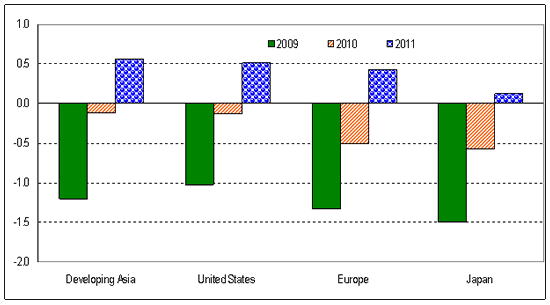
Source: UNCTAD, World Investment Prospects Survey 2009-2011
Note:-2 = very pessimistic; + 2 = very optimistic
Figure 4: The 15 most attractive economies for the location of FDI, 2009-2011(Per cent of responses)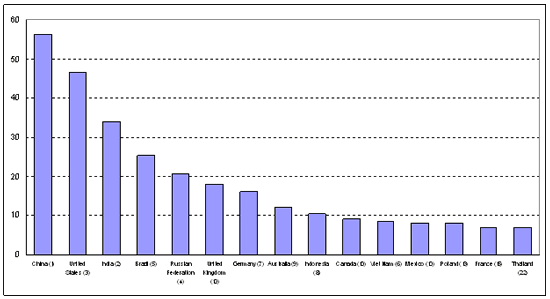
Source: UNCTAD, World Investment Prospects Survey 2009-2011
Note:The percentage is calculated based on the number of times the country was mentioned, divided by the number of responding companies. Figures in parentheses indicated rankings of the previous survey (2008-2010). Figures may add up to more than 100 % due to multiple responses.
Figure 5: Impact of the economic downturn on investment programmes, 2009-2011, by sector/industry(Average of responses)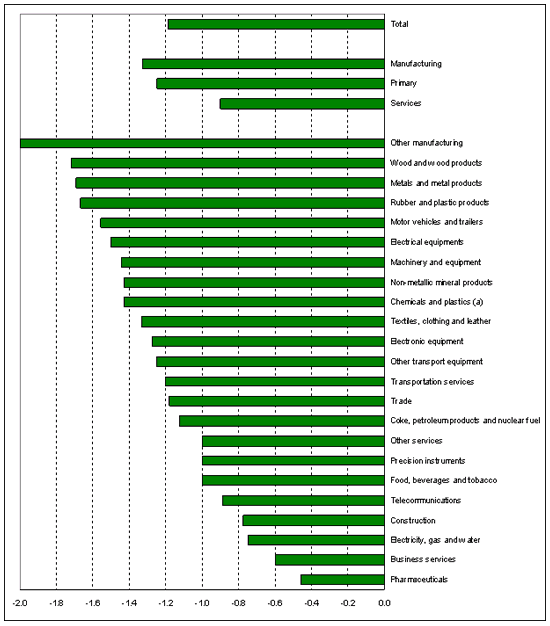
Source: UNCTAD, World Investment Prospects Survey 2009-2011
Note: 0 = no effect; - 2 = very negative effect.
a Excludes pharmaceuticals.


